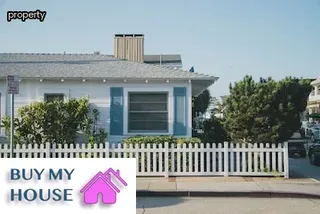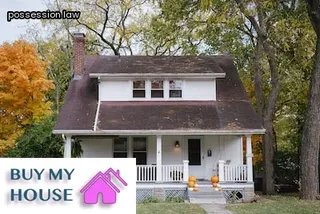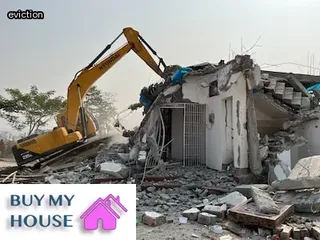Squatting, in a legal sense, is when an individual takes possession of a building or land that they do not own and holds it as their own. This can often occur when a person moves into an abandoned or vacant building and claims it as their own.
Generally, squatters have no legal right to the property they are occupying and are subject to eviction by the rightful owner. Squatting is illegal in most states, including New York.
However, certain circumstances may allow squatters certain rights such as the right to remain on the property until they are evicted or receive compensation for improvements made to the property while occupying it. It's important to understand these rights before engaging in any form of squatting in New York, as ignoring them can result in criminal charges and hefty fines.

The terms ‘squatting’ and ‘trespassing’ are often used interchangeably, but they are two distinct legal concepts. Squatting occurs when a person takes possession of a property without permission from the owner.
Trespassing, on the other hand, is illegal entry into private property without permission or right to do so. In New York, squatting is considered a civil violation and trespassing is a criminal offense.
The penalty for squatting is an eviction notice while trespassing can result in jail time. Squatters have the right to stay on the premises until they are legally evicted by court order.
This means that occupying the property does not constitute trespassing as long as it was done with no intention of causing harm or damage. Furthermore, if squatters remain on the land for a certain period of time, they may be able to claim title to the property under adverse possession laws.
As such, it is important for New Yorkers to understand their rights and obligations when it comes to housing laws so as to avoid potential legal issues.
Squatting in New York is a complicated issue, as there are many laws and regulations that must be taken into account. In the state of New York, squatter's rights are governed by a variety of statutes and common law principles.
The most important of these principles is the doctrine of adverse possession, which states that if a person has been occupying a property for an extended period of time without the owner's permission, they can gain legal title to it. This means that if a squatter has been living in a property for at least 10 years without challenge from the owner or any other party with interest in the property, they may be able to claim ownership.
Additionally, squatters may have recourse through rent stabilization laws if they have been renting a property for an extended period of time. Squatters may also be entitled to protections under New York's housing code and tenant-landlord laws.
It is important to note that squatting on public land is illegal throughout New York State and can lead to criminal charges. Understanding all of these laws and regulations is essential when dealing with squatters' rights in New York.

In New York, it can be difficult to determine who qualifies as a squatter. Generally speaking, a squatter is someone who occupies a residence without the consent or knowledge of the property's legal owner.
To qualify as a squatter in New York, an individual must have been living in the dwelling for at least 30 days and must not have any lease or rental agreement with the property owner. It is also important to note that squatting on public land is illegal in most cases.
In order to qualify as a squatter in New York, an individual must establish that they are occupying the space with the intention of maintaining ownership over it, meaning that they must have taken steps such as changing locks or making physical improvements to the property in order to make it their own. Squatters may also be able to claim rights if they were given permission by another person with legal authority over the property.
Ultimately, determining whether someone qualifies as a squatter in New York is determined on a case-by-case basis and requires an understanding of complex housing laws.
In New York, squatters rights are an important part of the state’s housing laws that many people are not aware of. Squatters rights refer to the legal principle that an individual can gain legal possession of a property through continuous occupation and use if they have done so without permission from the owner or landlord.
The length of time required to establish squatters rights in NY varies depending on the situation, but it is usually at least one year. In addition, squatters must be able to prove that they have made improvements to the property, such as repairs or renovations.
If a squatter is successful in claiming a property under these conditions, they can then either rent or purchase the property after obtaining permission from the court. It is important for individuals who are considering taking advantage of these laws to understand their rights in order to protect themselves and avoid potential legal issues with local authorities.

In New York, gaining possession of a property as a squatter can be a tricky and potentially dangerous process. It is important to understand the laws in place before attempting to enter any property in an effort to establish residence.
Generally speaking, squatter's rights are established when an individual occupies a property for an extended period of time without permission from the owner or legal tenant. In order for a squatter to successfully gain possession of a property, they must first prove that they have been living there for at least 10 years without interruption or interference from the owner.
This can be done by submitting evidence such as utility bills, mail addressed to them at the address, and other forms of proof that they have resided there for an extended period. The court will also consider whether or not the owner has made any attempts to reclaim the property during this time frame and if so, how long ago was it made.
If all criteria are met, then squatters may be able to claim ownership of the home or apartment unit that they’ve been occupying since their residency began. Although in some cases this process is lengthy and difficult, it is possible for squatters to gain legal possession of a property with enough due diligence and documentation.
It’s important to be aware of the legal implications and rights of squatters in New York, so that you can ensure your property is secure from unwanted intruders. To prevent a squatter from accessing your property, there are several steps you can take.
Firstly, make sure all locks have been changed after a tenant moves out and that no additional keys are known to exist. Additionally, check and monitor your property regularly to make sure it is not being unlawfully occupied.
Make sure any repairs or maintenance work completed is done by professionals who will provide documentation as proof that they have worked on the premises. If necessary, contact local law enforcement to assist with preventing trespassers from entering onto your land.
Finally, if an individual has entered and taken up residence without permission then it is recommended that they be served an eviction notice and given an appropriate amount of notice in accordance with state laws before legal action is taken against them.

Evicting a squatter in New York can be a difficult process, as their rights and obligations are often not clear. In order to successfully evict a squatter from your property, you must have a valid legal claim to the property, provide an eviction notice to the squatter with detailed information about the reasons for the eviction, and follow all procedures and laws related to evicting someone from your property.
If all of these steps are followed correctly and the squatter refuses to leave voluntarily or pay rent, then it may be necessary to take them to court and obtain an order of eviction. Once this has been obtained, it is up to you or your local law enforcement agency to enforce it.
The court order will state how long they have to vacate the premises, which typically ranges between fifteen days and a month. It is important that both parties abide by any court orders issued in order for the eviction process to proceed smoothly without any further legal action being taken against either party.
Adverse Possession is a legal process that allows someone to take ownership of a piece of property they do not own. This process is often used by squatters who live on another person’s land without their permission.
In New York, the laws around this matter can be tricky, so it's important to understand how they work. To start with, you must possess the land for 10 consecutive years before you can file for adverse possession in court.
During this time, you must also prove that you have acted as the true owner of the land and made improvements to it such as building a fence or planting trees. Additionally, you should be aware that your claim may be defeated if the original owner challenges it in court or pays back taxes on the land.
Finally, even if you are successful in claiming adverse possession, some restrictions may still apply such as not being able to sell or transfer title to the property without permission from the original owner.

New York State is home to some of the most comprehensive landlord-tenant laws in the country. In particular, these laws provide extensive protections for tenant rights, including those of squatters living in New York City.
Squatters are not formally recognized as legal tenants under state law and do not have the same protections as other tenants. However, given that squatters may still be able to stay in a property for long periods of time, it is important for landlords to understand their rights when dealing with them.
Generally speaking, landlords in New York can file an eviction action against a squatter living on their property if they can prove that the squatter has no reasonable claim to occupancy or that the squatter has caused damage to the property. Additionally, landlords may also be able to obtain a court order allowing them to physically remove a squatter from their property and take any necessary legal steps to secure possession of it.
Finally, squatters may also be subject to criminal prosecution if they remain on a landlord’s property without permission after being ordered by a court to vacate it. It is therefore important for both landlords and squatters alike to familiarize themselves with applicable landlord-tenant laws in order to ensure that their respective rights are protected.
In New York, it is illegal for a person to occupy another person's property without permission. If you own property in the state and discover that someone is living on your land without authorization, then you have the right to challenge their occupation legally.
In order to challenge an unauthorized occupant of your property in NY, you must first contact the police department or local law enforcement agency and file a complaint. They will then investigate the situation and take appropriate action depending on the circumstances.
Additionally, if necessary, you can obtain a court order from a judge which mandates that the occupier vacate your premises within a specified period of time. It is important to note that it may be difficult to evict squatters as they are often protected by certain laws in New York.
Therefore, before taking any legal action against them, it is essential to understand all applicable state statutes as well as federal regulations pertaining to squatters' rights. Additionally, consulting with an attorney who specializes in such matters will be immensely helpful in ensuring that any eviction process is conducted properly and according to the law.

Common misconceptions about the rights of homeowners, tenants, and squatters can lead to confusion when it comes to understanding the legal implications of housing laws in New York. Homeowners possess a high degree of control over their property because they own it outright, while tenants and squatters have fewer legal rights due to the fact that they do not own the home or land they are occupying.
Tenants are protected by landlord-tenant law, which gives them certain basic rights such as the right to a safe living environment and access to repairs and maintenance. Squatters, however, do not have any legal protection and may be evicted without warning unless they occupy a property for a certain length of time.
In some cases, squatters may even gain title to a property if they stay on it for long enough. Understanding these distinctions is important for anyone renting or owning real estate in New York.
Yes, squatters in New York have certain rights when it comes to housing laws. In the state of New York, squatters are defined as persons who occupy a residence without legal permission or the right to do so.
Squatters may be able to establish occupancy rights if they have lived in a dwelling for an extended period of time, even if they are not the legal owner. To gain these rights, squatters must demonstrate that they have made significant changes to the property and that they regularly pay taxes on it.
If a squatter can prove these things, then they may be able to establish occupancy rights which could give them some of the same protections tenants with leases would receive such as eviction notice and relocation assistance. Despite their potential legal rights, it is important for any squatter to understand that this is not a permanent situation and that their claim may be challenged in court.
Ultimately, understanding squatters' rights in New York requires knowledge of both state and local regulations related to housing and tenant-landlord law.

Squatters rights in New York is often misunderstood due to the complex legal systems that are involved. Generally, there is no "set" amount of time that an individual can occupy a property without permission.
However, depending on the situation and circumstances, squatters may be able to stay in a property for an extended period of time before being evicted by the rightful owner. This period of time may range from several weeks to several months, or even up to two years.
In order to understand how long squatters rights are applicable in New York, it is important to familiarize oneself with the state’s housing laws and eviction policies. Depending on the severity of the situation and whether or not legal action has been taken against the squatter, they may be able to remain living in a property for an extended period of time before being evicted by its rightful owner.
New York is one of the few states in the US that has specific laws governing squatters’ rights. When it comes to understanding the squatter rules in the state, there are a few things you should know.
If a person occupies a property without permission for more than 30 days, they may be eligible to obtain legal ownership of the property through adverse possession. Though this may sound like an easy way around paying rent, there are several requirements that must be met before ownership can be awarded.
The squatter must occupy the property openly and continuously for 10 years or more, paying all applicable taxes during this time. Additionally, their occupancy must be exclusive and hostile—meaning that they cannot share with another tenant or the original owner—and their occupancy must be visible to the public for all 10 years.
Finally, they must prove that they have paid all taxes and fees associated with owning the property such as water and sewer bills. Though these laws may seem complex, understanding them can help protect both tenants and landlords from being taken advantage of in any rental agreement.
Evicting a squatter in New York City can be a long and arduous process, with numerous steps that must be taken before the squatter is legally removed from the property. Depending on the circumstances of the situation, it can take anywhere from two weeks to several months to complete the eviction process.
The first step that must be taken by landlords is filing an “Unlawful Detainer” complaint with the court system. This document informs the squatter about their rights and signals that an eviction proceeding has begun.
After this, a hearing must take place before a judge who will decide if an eviction notice should be issued. If approved, the landlord must then serve an official eviction notice which gives the squatter at least five days to vacate or face physical removal by law enforcement officers.
Additionally, there are certain criteria for evicting squatters in NYC that must be met such as proof of ownership of the property and proof of residency of the squatter on said property. Ultimately, it is up to law enforcement officers to ensure that squatters are removed from their residence in a legal and timely manner.